|
|
|
Sort Order |
|
|
|
Items / Page
|
|
|
|
|
|
|
| Srl | Item |
| 1 |
ID:
173169
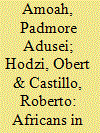

|
|
|
|
|
| Summary/Abstract |
Relations between China and African nations have intensified following the ratification of several multilateral and bilateral developmental agreements, especially after the third Forum on China-Africa Cooperation (FOCAC) summit in 2006. In the past decade, the relations have transcended to the micro-level, with important implications for households and individuals. Of note are the varying forms of population migration between the two places for reasons ranging from business ventures, education, asylum-seeking and family making and reunification. Using various primary and secondary data sources, the seven articles in this special issue delve into the wellbeing, social identities and different kinds of socio-cultural and economic inequalities of Africans in China and Chinese in Africa. Altogether, the articles affirm that policies and mechanisms to ensure decent living conditions, enhanced sense of belonging and social equity among Africans in China and Chinese in Africa are critical to the future of China-Africa relations.
|
|
|
|
|
|
|
|
|
|
|
|
|
|
|
|
| 2 |
ID:
167072
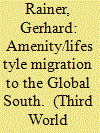

|
|
|
|
|
| Summary/Abstract |
While most research into amenity/lifestyle migration still focuses on rural places in the Global North, it has recently been acknowledged that international North–South migration is a growing phenomenon. Against the backdrop of strong media attention to Global North immigration, there is a need to focus more on the rapidly increasing – but much less visible – migration streams of lifestyle/amenity movers to the Global South, and particularly on their implications for local and global inequalities. This is what this paper proposes, and it pursues this goal by providing a comprehensive review of the growing interdisciplinary literature on amenity/lifestyle migration in Latin America. From a critical geographical perspective, it firstly discusses key political economic factors that drive the production of high-amenity places in Latin America. The focus will be on real estate business and land markets. Secondly, the article analyses the local to global socio-spatial consequences of international amenity/lifestyle migration. The paper argues that amenity/lifestyle migration to Latin America builds on, and deepens, historically inherited global and local inequalities, which in many areas – rural and, increasingly, also urban – manifest themselves through growing social-spatial exclusion and fragmentation.
|
|
|
|
|
|
|
|
|
|
|
|
|
|
|
|
| 3 |
ID:
122382
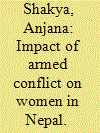

|
|
|
| 4 |
ID:
095652
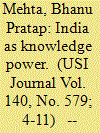

|
|
|
| 5 |
ID:
096573
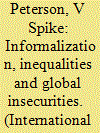

|
|
|
|
|
| Publication |
2010.
|
| Summary/Abstract |
Global restructuring has dramatically affected the value, extent, and significance of informal economic activities worldwide. Approaching informalization as a systemic phenomenon, this essay illuminates linkages among economic processes, widening inequalities, "governance gaps," and global insecurities. It considers the historical context in which distinctive approaches to informality emerged and reviews three principal "islands" of existing research: mainstream, structuralist, and feminist. These variously illuminate patterns of economic inequality that are central to studies of international political economy. Informality's significance to IR and security studies is further illuminated through a discussion of the processes and political economy of informalization in relation to global migrations, and the interaction of economic and political informalization in the context of "new" wars and security crises.
|
|
|
|
|
|
|
|
|
|
|
|
|
|
|
|
| 6 |
ID:
152524


|
|
|
|
|
| Summary/Abstract |
This paper examines intra-household and socio-cultural factors leading to differential outcomes in educational attainment by gender and birth order amongst smallholder oil palm households in Papua New Guinea. Not all children share equitably in the household resources allocated to education: females have lower average education levels than males, and high birth order children have higher education attainment than lower birth order siblings, indicating preferential parental investment in sons and early born children. The findings demonstrate that despite households having regular access to relatively high incomes from oil palm and residing in close proximity to schools, primary school net enrolment rates remain significantly lower than those for East Asia and the Pacific region, and the millennium development goal of universal primary education has not been met. This finding is likely to be the result of a combination of intra-household factors including gender power imbalances, low parental education levels, the agency of youth in educational decision-making and the weakening attraction of education as a means of improving income-earning potential.
|
|
|
|
|
|
|
|
|
|
|
|
|
|
|
|
| 7 |
ID:
133426
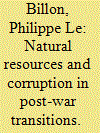

|
|
|
|
|
| Publication |
2014.
|
| Summary/Abstract |
Many 'post-conflict' countries face difficulties in reaping the full benefits of their natural resource wealth for reconstruction and development purposes. This is a major issue given these countries' needs and the risk of seeing 'mismanaged' primary sectors undermine a transition to peace. Bringing together debates about the 'inequality-mistrust-corruption' trap and relationships between natural resources and corruption, this paper suggest that some resource sectors may be more likely to foster inequalities, and thereby increase corruption and distrust, while others are less likely to do so. Reviewing arguments and empirical evidence, I point to the relative importance of transition contexts, stakeholder incentives and resource sector characteristics, and suggest how resource-related corruption may be better understood in relation to trust-building and reconciliation processes.
|
|
|
|
|
|
|
|
|
|
|
|
|
|
|
|
| 8 |
ID:
134288
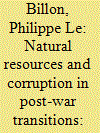

|
|
|
|
|
| Summary/Abstract |
Many ‘post-conflict’ countries face difficulties in reaping the full benefits of their natural resource wealth for reconstruction and development purposes. This is a major issue given these countries’ needs and the risk of seeing ‘mismanaged’ primary sectors undermine a transition to peace. Bringing together debates about the ‘inequality-mistrust-corruption’ trap and relationships between natural resources and corruption, this paper suggest that some resource sectors may be more likely to foster inequalities, and thereby increase corruption and distrust, while others are less likely to do so. Reviewing arguments and empirical evidence, I point to the relative importance of transition contexts, stakeholder incentives and resource sector characteristics, and suggest how resource-related corruption may be better understood in relation to trust-building and reconciliation processes
|
|
|
|
|
|
|
|
|
|
|
|
|
|
|
|
| 9 |
ID:
121093
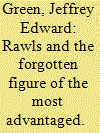

|
|
|
|
|
| Publication |
2013.
|
| Summary/Abstract |
This article aims to correct the widespread imbalance in contemporary liberal thought, which makes explicit appeal to the "least advantaged" without parallel attention to the "most advantaged" as a distinct group in need of regulatory attention. Rawls's influential theory of justice is perhaps the paradigmatic instance of this imbalance, but I show how a Rawlsian framework nonetheless provides three justifications for why implementers of liberal justice-above all, legislators-should regulate the economic prospects of a polity's richest citizens: as a heuristic device for ensuring that a system of inequalities not reach a level at which inequalities cease being mutually advantageous, as protection against excessive inequalities threatening civic liberty, and as redress for a liberal society's inability to fully realize fair equality of opportunity with regard to education and politics. Against the objection that such arguments amount to a defense of envy, insofar as they support policies that in certain instances impose economic costs on the most advantaged with negative or neutral economic impact on the rest of society, I attend to Rawls's often overlooked distinction between irrational and reasonable forms of envy, showing that any envy involved in the proposed regulation of the most advantaged falls within this latter category.
|
|
|
|
|
|
|
|
|
|
|
|
|
|
|
|
| 10 |
ID:
095585
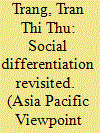

|
|
|
|
|
| Publication |
2010.
|
| Summary/Abstract |
This article analyses the processes of transformation and differentiation since the 1950s in a Vietnamese rural village, hereafter called Chieng Hoa.1 It examines how radical changes in political discourse and economic policies at the national level have affected the welfare and social relations of villagers and how the latter have in turn coped, resisted, as well as shaped such structural changes. Using concrete life stories of local people, the article identifies the winners and losers in this transformation process, the trajectories households or individuals have taken to arrive at their current positions, and the strategies that they are adopting for the future. It demonstrates that differentiation in Chieng Hoa implies changes in social relations, including but not limited to relations of production, and that even within this single locality, differentiation can take various forms and processes over time, whether specific to or cutting across changes in macro-policies. The article also reveals that in the often perceived equal collectivisation, inequalities still existed and became causes of differentiation in the subsequent decollectivisation period. However, while conditions for a permanent differentiation were present, such process has failed to materialise in the current integration period. Differentiation has become more unpredictable as past winners can lose out due to unstable market conditions.
|
|
|
|
|
|
|
|
|
|
|
|
|
|
|
|
| 11 |
ID:
171072
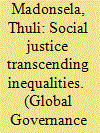

|
|
|
| 12 |
ID:
133656
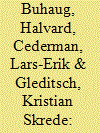

|
|
|
|
|
| Publication |
2014.
|
| Summary/Abstract |
Much of the recent research on civil war treats explanations rooted in political and economic grievances with considerable suspicion and claims that there is little empirical evidence of any relationship between ethnicity or inequality and political violence. We argue that common indicators used in previous research, such as the ethno-linguistic fractionalization (ELF) and the Gini coefficient for income dispersion, fail to capture fundamental aspects of political exclusion and economic inequality that can motivate conflict. Drawing on insights from group-level research, we develop new country-level indices that directly reflect inequalities among ethnic groups, including political discrimination and wealth differentials along ethnic lines. Our analysis reveals that these theoretically informed country profiles are much better predictors of civil war onset than conventional inequality indicators, even when we control for a number of alternative factors potentially related to grievances or opportunities for conflict.
|
|
|
|
|
|
|
|
|
|
|
|
|
|
|
|
| 13 |
ID:
168870
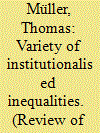

|
|
|
|
|
| Summary/Abstract |
This article argues that the research on institutionalised inequalities pays too little attention to competing understandings of stratification and the variety of interlinkages between the patterns of stratification and the institutions of international society. Building on the English School and theories of stratification, it develops an analytical framework that conceptualises these ‘stratificatory interlinkages’ as a twofold decision: firstly for a coupling – instead of a decoupling – of institutional characteristics to patterns of stratification and secondly for a specific classification scheme and type of interlinkage. The article draws on empirical examples from the League of Nations and other interwar international institutions to demonstrate that different understandings of stratification and classification schemes were used for different institutional purposes, for example, voting rights and the apportionment of budget expenses. In addition, it proposes four analytical dimensions that allow mapping the variety of classification schemes and types of interlinkages that were chosen for institutionalised inequalities. The dimensions relate to the composition of the reference group, the decision-making about the classification scheme, the institutional purposes, and the institutional form of the interlinkage. The variety of stratificatory interlinkages entails a more variable and diverse relation between stratification and institutions than usually assumed.
|
|
|
|
|
|
|
|
|
|
|
|
|
|
|
|
| 14 |
ID:
142845
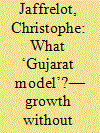

|
|
|
|
|
| Summary/Abstract |
As chief minister of Gujarat, Narendra Modi claimed that his state was a ‘model’ of development. While his government achieved a remarkable growth rate, his public policies as well as his politics have been on par with growing inequalities. The collaboration between the state and the corporate sector—an old tradition in Gujarat—gained momentum under Modi, businessmen benefitting from low wages, acquiring land more quickly and at a better price, and obtaining more tax breaks, etc. Simultaneously, Gujarat spent less than most of the other states of India on education and health. Even though the ‘Gujarat model’ cultivates social polarisation, Narendra Modi was able to win elections three times in the state for two major reasons. First, the main casualties of this political economy have been Muslims, Dalits and Adivasis, who do not represent more than 30 percent of society. Second, the beneficiaries of this ‘model’ were not only the middle class, but also a ‘neo-middle class’ made up of those who have begun to be part of the urban economy or who hope to benefit from it—the ‘neo-middle class’ is primarily aspirational. These groups were numerous enough to allow Modi's BJP to win successive elections in Gujarat. The BJP got more than 50 percent of the votes only once, in 2002, but the main party can get an absolute majority with less in a first-past-the-post system. While the BJP is known for its expertise in religious polarisation, this is clearly a case of social polarisation in which the ethno-religious identity quest of the middle and neo-middle classes continues to play a role.
|
|
|
|
|
|
|
|
|
|
|
|
|
|
|
|
| 15 |
ID:
126182
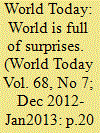

|
|
|
|
|
| Publication |
2012-13.
|
| Summary/Abstract |
A round-up of unexpected developments on the world stage in 2012, form the deaths of key Middle East players to the rise of K-pop
|
|
|
|
|
|
|
|
|
|
|
|
|
|
|
|
|
|
|
|
|